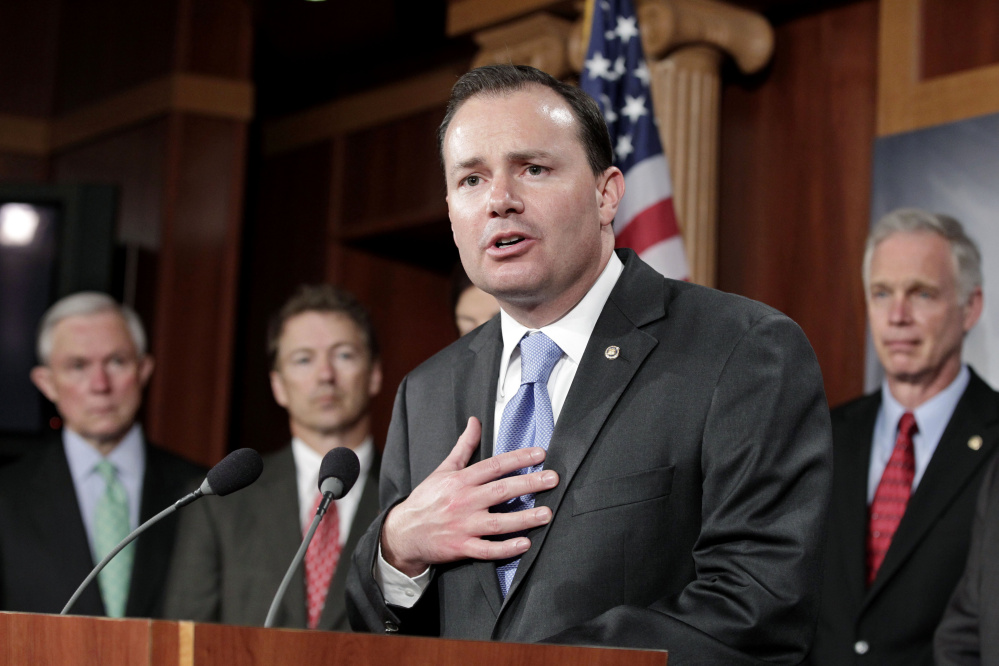WASHINGTON — Prominent conservatives are lobbying Donald Trump to say that he will nominate Sen. Mike Lee, R-Utah, to the Supreme Court if he’s elected president.
And Trump’s main rival for the nomination, Ted Cruz, has already said he’d consider his best friend in the Senate for the seat that opened with Antonin Scalia’s death.
As President Obama traveled to the University of Chicago on Thursday to deliver a speech calling for Merrick Garland’s confirmation, Senate Republican leaders were expressing confidence they can hold firm through the November election in refusing to grant Garland even a hearing.
If Hillary Clinton wins in November, there will be pressure to quickly confirm Garland so that she could not appoint someone who is younger and more liberal. If she loses, then the next Republican president will get to nominate someone else.
While the rest of the mainstream media is preoccupied with the Garland battle, conservative luminaries are increasingly looking ahead to next year and quietly touting Lee as a potential nominee. Republican senators like this idea, and Democrats are figuring out how they’d respond.
Trump promises that he will soon unveil a list of 10 to 12 names from which he would nominate a Supreme Court justice.
“I’m going to announce that these are the judges, in no particular order, that I’m going to put up,” he told The Washington Post last week. “And I’m going to guarantee it. … Because people are worried that, oh, maybe he’ll put the wrong judge in.” He said he’s “getting names” from Alabama Sen. Jeff Sessions, The Federalist Society and The Heritage Foundation.
Lee “would be a very good choice, I think,” Sessions told The Washington Post.
Heritage offered up a wish list of eight “highly qualified candidates” that includes Lee. Besides him and former George W. Bush Solicitor General Paul Clement, the six others are sitting judges.
None are surprising: William Pryor Jr. on the 11th Circuit Court of Appeals, Diane Sykes on the 7th Circuit, Steven Colloton and Raymond Gruender on the 8th Circuit, Brett Kavanaugh on the D.C. Circuit and Don Willett, who is a justice on the Texas Supreme Court.
John Malcolm, director of the think tank’s Edwin Meese Center for Legal and Judicial Studies, devised the list after consulting with other conservatives.
“He’s a very bright lawyer,” Malcolm said of Lee in an interview. He praised him as an originalist with “intestinal fortitude.”
Right now, Clinton leads both Trump and Cruz in head-to-head matchups, so Republicans are currently the underdogs in the Supreme Court fight. But if they win the White House, Lee would be a dream pick for conservative activists:
– He has the right pedigree: Six years ago, fueled by tea party anger, he toppled Sen. Bob Bennett at a Republican state convention. His father, Rex Lee, was Ronald Reagan’s solicitor general. After graduating from Brigham Young University Law School, the senator clerked for Samuel Alito when he was on the Third Circuit and then again after Alito’s elevation to the Supreme Court. He was an assistant U.S. attorney in Salt Lake City and general counsel for then-Gov. Jon Huntsman before running for office himself.
– He’s incredibly young: Lee is just 44. That means he could squeeze four or more decades out of a lifetime appointment.
– He is dependably conservative. Grassroots leaders are adamant that future Republican nominees have a long paper trail to avoid confirming stealth moderates. They still feel burned by David Souter, Sandra Day O’Connor and John Paul Stevens.
Many Republican base voters even feel betrayed by John Roberts because of his support for upholding the Affordable Care Act. Dropping the conservative chief justice’s name at a Republican campaign event is a surefire way to draw boos nowadays. Cruz often finds himself defensively explaining away his support for Roberts’ confirmation. He tells audiences he would have picked Edith Jones instead of Souter in 1990 and Mike Luttig, for whom he clerked, instead of Roberts in 2005.
Lee, for his part, wrote an e-book in 2013 called: “Why John Roberts was wrong about Healthcare.”
Send questions/comments to the editors.



Success. Please wait for the page to reload. If the page does not reload within 5 seconds, please refresh the page.
Enter your email and password to access comments.
Hi, to comment on stories you must . This profile is in addition to your subscription and website login.
Already have a commenting profile? .
Invalid username/password.
Please check your email to confirm and complete your registration.
Only subscribers are eligible to post comments. Please subscribe or login first for digital access. Here’s why.
Use the form below to reset your password. When you've submitted your account email, we will send an email with a reset code.